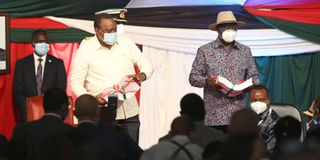Long the outsider, Raila now the insider shaping Uhuru succession

President Uhuru Kenyatta and ODM leader Raila Odinga distribute BBI signing documents to regional representatives in Nairobi on November 25,2020 when they launched the collection of signatures.
What you need to know:
- President Kenyatta and Mr Odinga have, like their fathers of similar names of the independence struggle and immediate post-independence era, been implacable foes.
Vice President Daniel Moi inherited the presidency to the chagrin of his inner circle.
In this and the next three year-ender pieces, I will review 2020 in the context of the 2017 General Election and its aftermath, the 2022 General Election and the Kenyatta II succession, and the rampaging coronavirus pandemic.
I will also look at the dramatis personae, namely President Uhuru Kenyatta, his foe-turned-fan Raila Odinga and the man the two desperately wish to put out of the succession equation, Deputy President William Ruto.
My motivation is, one, the launch of the hunt for signatures to enable a referendum, which marks a new phase in the change-the-Constitution drive. The referendum is a halfway point to the 2022 General Election and post-Kenyatta dispensation.
This makes 2021 as political a year as 2022 will be. It marks the first time Kenya will have two national elections in two years. The referendum especially will be happening during the pandemic that has plundered the economy and decimated lives and livelihoods.
Red-hot favourite
Two, this will be a succession like no other. It will anchor the next General Election and the resultant dispensation. So far it has been managed all the way by the President and his heir apparent, or red-hot favourite to succeed him, Mr Odinga.
But neither wants to say this is what it is. President Kenyatta and Mr Odinga have, like their fathers of similar names of the independence struggle and immediate post-independence era, been implacable foes.
But unlike their fathers, who remained bitter enemies to the end, they have a camaraderie that has surprised many since its advent in early 2018. A Kikuyu-Luo alliance and teamship for power, which was unthinkable to many, and for many decades, now seems imminent.
Indeed, most observers expect this alliance to front the coming referendum and charge to power in 2022. Indeed, it may be the spearhead of the Yes campaign and lead the campaign for President Kenyatta's successor a year hence.
How is this succession going to be different? In 1978, founding President Jomo Kenyatta died in his sleep having deliberately refused to intervene in the constitutionally-designed path to his succession.
Political greenhorn
Vice President Daniel Moi inherited the presidency to the chagrin of his inner circle. Led by the Kiambu duo of Njenga Karume and Njoroge Mungai, Nakuru titan Kihika Kimani, and Ukambani lion Paul Ngei, they, in 1976, unsuccessfully sought to change the law to bar Moi from succeeding old Jomo.
In 2002, President Moi defiantly and unexpectedly named Mr Kenyatta, a political greenhorn, his successor and went flat out to campaign for him in the General Election.
But Kenyans seeing in the novice a design for Moi to succeed himself after 24 years in power, handed Mr Mwai Kibaki the baton to end the 40-year-long dominance of Kanu on Kenya's politics and government.
Octogenarian Kibaki, worn down by the demands of high office in a forced coalition, the pressures of the trial of Kenyans on charges of crimes against humanity arising from his disputed 2007 re-election, wanted no part in an elaborate presidential succession process.
Power broker
But his State House aides, allies and advisers were split between Mr Kenyatta and Mr Musalia Mudavadi. Mr Kenyatta, at one time, appeared keen to give Mr Mudavadi the nod. But tables were eventually turned and Mr Kenyatta teamed up with Dr Ruto in a Kikuyu-Kalenjin alliance that swept to power in 2013.
Two years hence, President Kenyatta should be going into retirement, but not if organised labour boss Francis Atwoli has his way. Power broker Atwoli would like Mr Kenyatta to be retained in some executive capacity.
And so we have a referendum to expand the Executive and so the President, unlike his father, is playing an increasingly important and highly visible role in his succession. Moi, a largely peripheral figure, did not fight to succeed Kenyatta but was himself fought furiously.
Mr Kibaki was kicked out of his VP's perch and out of the line of succession, but the return of multi-party politics gave him a lifeline to succeed the man who did not want him to ever be president.
Mr Odinga, for long the outsider, is now the unelected powerhouse and insider shaping the Kenyatta II succession.





